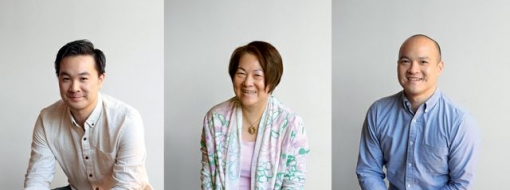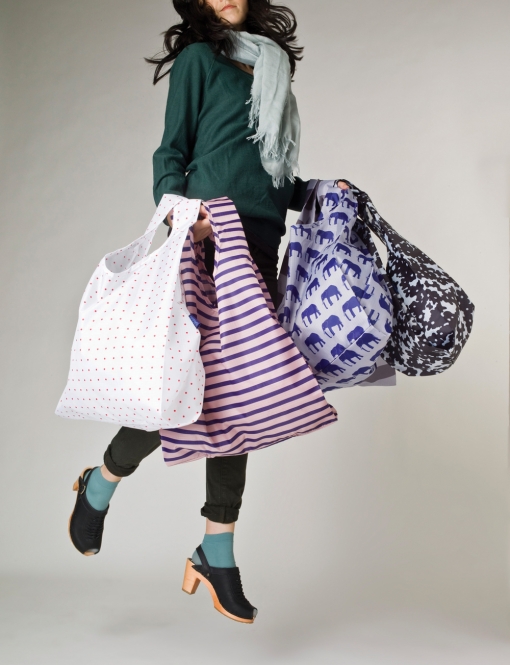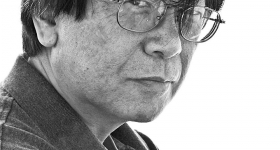Where there’s family, there’s baggage. But sometimes the inverse is true: Where there’s baggage, there’s family. That’s what two New York-based bag entrepreneurs, Lo & Sons and Baggu, found as they took their ideas from family dinner conversation to real products.
Retired and frequently traveling, Helen Lo was in search of a sensible travel bag that was neither a piece of luggage nor a handbag — for travelers who, like herself, wanted to travel light and look smart. Eventually she was prompted by her son Jan, who was working for the global design firm IDEO in Shanghai, China, to make the bag she could not find.
Jan started by conducting simple research at airports: asking women what they were looking for in a travel bag. With what he learned and the easy access to factories based in China, he was able to transform his mother's idea into a real product.
They convinced Jan’s brother Derek to leave his advertising job and join the family business during a family vacation in Hawaii. “It was just the perfect opportunity,” Derek says. Though a risk, he had already been thinking about starting his own business. Helen, whose own background is in social work, has not shied away from the new venture despite her lack of experience. “I think it’s important for Asian Americans to not limit ourselves to roles or businesses that we’re ’supposed’ to be doing.”

The creators of Lo & Sons, from left to right, Derek, Helen, and Jan Lo. (Courtesy of Michelle Drewes.)
Seven rounds of prototypes later, the year-old company now produces lightweight travel bags that the family is comfortable putting their name on. Their line of seven bags, ranging from cross-body pouches to laptop totes and overnight bags, features a patent-pending design with an internal support strap system and comes in darker shades of black, blue and green, black and red for those who like to pop. Made of water-resistant nylon with leather straps, the bags follow function and form, pockets where you need them (a side pocket for shoes and a front one for travel documents, for example), padding for laptops and a range of colors to keep it chic. Their most popular product is the O.G., which doubles as an overnight and gym bag.
Jan pointed out that the genesis of Lo & Sons ran counter to the usual formation of family businesses. “Usually, the older generation starts it and then passes it down to the next generation,” he says. “We all started out together.“
Their design process is nontraditional as well, Derek says. “A lot of people are miffed when they ask us who designed the bag and we say, well, it’s a collective process.” He also believes the fluid, evolving roles and different sets of interests and skills have also helped lessen the friction that often comes with working with family. “We’re just doing our thing,” he says. “This is our family.” (Creativity must run in the genes: Hyphen’s Director of Photography Andria Lo is a relative.)
As co-workers, Jan says he now appreciates more facets of his mother. “It’s been cool to get to know your parent, and to see different sides. You get to see the professional side. Most people don’t get that chance to see that side of their family member.”
 Baggu bags
Baggu bags
The familial creative collaboration for Emily Hall Sugihara — who started her bag company Baggu with her mother, Joan — began when she was in kindergarten. To help ease Emily’s separation anxiety, she and her mother sewed a special blanket for nap time together, made up of pastel colors and sewn-on flower petals.
In 2007, they put their heads — and hands — together again to design the original baggu, the Japanese word for “bag.”
“It was really to try to come up with a reusable bag that worked for us — not even thinking about business in the beginning,” Joan says.
Both mother and daughter share an arts background: Emily is a Parsons School of Design graduate while Joan has a bachelor’s degree from the University of Michigan’s School of Art and Design and once taught lithography and etching at Princeton University. They bring their artistic sensibilities to the bags, which come in an assortment of bright colors and fun prints.
In the early days, family members pitched in to support the fledgling business: Emily’s father was an early investor and her brother helped pack some of the first shipping orders. Four years later, Baggu now has 10 employees and has also expanded into a line of backpacks and leather bags.
Though the business has grown, Emily says they still make decisions as a family, whether related by blood or not. “Baggu has very little bureaucracy. We treat our team as family and have a lot of emphasis on quality of life. It’s a different overall vibe to work for a family business than in a more corporate environment.”
Working with family has its challenges, but Helen Lo has found that their “family baggage” has actually helped in running their business. “With family, you feel comfortable talking about things or even fighting. Even if you fight, you always work things out.”
See Lo & Sons and BAGGU’s favorite Asian American product lines.
Anne Phabmixay is a NY-based writer.
Correction (May 15, 2012): Jan Lo did not work for IDEO in Shanghai. While living in Beijing, he worked for Kaizor Innovation, a strategic innovation consultancy. Also, Lo did not interview women in airports about travel bags, but observed travelers in airports and separately conducted interviews with men and women business travelers.









Comments